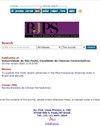文化因素、护理人员接受的健康教育水平和污名对约旦南部儿童哮喘治疗的影响
IF 0.9
4区 医学
Q4 PHARMACOLOGY & PHARMACY
引用次数: 0
摘要
本文章由计算机程序翻译,如有差异,请以英文原文为准。
The Impact of Cultural Factors, The Level of Health Education Received by the Caregivers, and Stigma on Asthma Treatment among Children in Southern Jordan
For asthma treatment in children, caregivers need good knowledge and attitudes regarding the disease and its treatment. This study aimed to determine the impact of cultural factors, the level of health education provided to patients and their families, as well as the impact of stigmatization on the treatment awareness of children with asthma in southern Jordan. A validated questionnaire was used to collect data from a sample of ninety-seven caregivers selected from three hospitals in southern Jordan. Open ended questions were answered after demonstrating the inhaler technique in and evaluated according to the instructions of the National Asthma Education and Prevention Program (NAEPP, 2013). The result revealed moderate knowledge of asthma with a mean score of (22.36/32), as well as moderate knowledge of asthma treatment (24.26/40). A high mean was found for the impact of cultural and environmental factors (22.93/28), whereas low impact was found for stigma with a mean value of (4.73/12). Therefore, to improve future asthma management, additional efforts are required to educate caregivers and improve their asthma awareness and rectify any falsehoods regarding asthma medications by health care providers.
求助全文
通过发布文献求助,成功后即可免费获取论文全文。
去求助
来源期刊

Brazilian Journal of Pharmaceutical Sciences
PHARMACOLOGY & PHARMACY-
CiteScore
1.40
自引率
0.00%
发文量
165
审稿时长
7.5 months
期刊介绍:
The Brazilian Journal of Pharmaceutical Sciences accepts for publication Original Papers applicable to the fields of Pharmaceutical Sciences; Reviews and Current Comment Articles, which are published under the Scientific Editor and Associate Editors invitation to recognized experts or when they are spontaneously submitted by the authors in the form of abstracts to have their importance evaluated. A critical view of the subject with insertions of results of previous works in the field in relation to the state of art must be included; Short Communications reporting new methods and previews of works on researches of outstanding importance in which originality justify a quick publication. A maximum of 2000 words excluding tables, figures and references is an acceptable limit. One table, one figure and ten references may be added, and Book Reviews of the latest editions of books, prepared by specialists invited by the Scientific Editor and Associate Editors. Thematic Supplements as well as those related to scientific meetings can be published under the Scientific Editor and/or Associate Editors agreement.
 求助内容:
求助内容: 应助结果提醒方式:
应助结果提醒方式:


